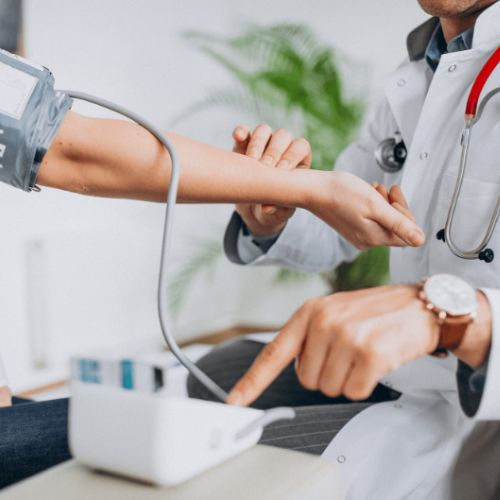Unlocking the Potential of NMN: A Promising Breakthrough in Hypertension Treatment
High blood pressure, or hypertension, is a looming menace that has been and is affecting millions of people in India and across the globe. It's surprising to learn that even the younger generation, aged 15 to 49, is grappling with this health issue, thanks to their hectic and stressful lifestyles. In India, the numbers are staggering, with approximately 234 million people dealing with high blood pressure. But there's hope on the horizon, and it comes in the form of NMN.
The Subdued Onslaught of Hypertension in India
The surge of hypertension has emerged as a prevailing contributor to cardiovascular ailments in India, exerting its influence on approximately 30% of the adult population. What is undeniably disquieting is its pivotal role in contributing to nearly 63% of the overall mortalities within the nation, with a substantial 27% ascribed directly to cardiac complications. However, the truly astonishing facet of this dilemma lies in the revelation that an overwhelming 45% of individuals aged 40 to 69 in India grapple with cardiovascular disorders. This pervasive prevalence of hypertension could be likened to a latent time bomb, poised to detonate. Nevertheless, amidst this conundrum, there arises a glimmer of hope - a beacon of potential progress in our quest for healthier hearts.
New Insight: The Burden of Economic Costs
Beyond the formidable health challenges posed by hypertension in India, there is an additional layer of concern that often remains obscured. The economic toll imposed by this silent epidemic is substantial. A study conducted by the Indian Heart Association estimated that the direct and indirect costs of treating hypertension in India amounted to a staggering 30 billion dollars annually. These costs encompass medical expenses, lost productivity, and the financial burden on families affected by hypertension-related complications. Thus, in our pursuit of mitigating the effects of hypertension, we are also confronted with the imperative need to alleviate its profound economic impact.
NMN: A Ray of Hope for Hypertension Patients
A recent study published in Signal Transduction and Target Therapy has set the scientific community buzzing with excitement. Led by Tao and associates from the First Affiliated Hospital of Sun Yat-sen University in China, this investigation has elucidated the promise of Nicotinamide Mononucleotide (NMN) as a paradigm-shifting remedy for hypertension.
Unveiling the Power of NMN
The researchers began by studying 19 adults aged 18 to 80, all dealing with mild hypertension. These individuals underwent lifestyle changes, including adopting a low-salt, high-fiber diet and engaging in regular aerobic exercise. However, the real breakthrough came when nine of them supplemented their lifestyle changes with 800 mg of NMN daily for six weeks, while the remaining 10 participants relied solely on lifestyle modifications.
The results were nothing short of astounding. The group taking NMN showed a significant drop in systolic blood pressure, a crucial indicator of hypertensive blood pressure. This discovery suggests that NMN can genuinely help lower blood pressure in people with hypertension.
Unlocking the NAD+ Connection
To unravel the underlying mechanisms at play, Tao and colleagues delved deep into the world of cellular biology. They uncovered that hypertension patients had significantly lower levels of blood cell NAD+ compared to healthy adults. However, when NMN was introduced alongside lifestyle changes, NAD+ levels in hypertensive patients shot up by approximately 43%. This incredible finding indicates that NMN might have the potential to restore NAD+ levels in hypertension patients.
But the story doesn't end there. The researchers also explored the role of the NAD+ consuming enzyme CD38 in endothelial cells. Surprisingly, they found that CD38 levels were over twice as high in hypertension patients compared to their healthy counterparts. This increased CD38 activity appears to be a contributing factor to the lower NAD+ levels in hypertension patients. Consequently, inhibiting CD38 could be a promising avenue for increasing NAD+ levels and mitigating high blood pressure.
A New Dawn for Hypertension Treatment
In the words of Tao and colleagues, "Hypertension is recognized as an age-related disease, and NAD+ supplementation may be a promising clinical strategy as an aging-targeted intervention for hypertension." This study presents the first human trial evidence showing that NMN can effectively lower blood pressure in patients with hypertension. Furthermore, it sheds light on the previously unexplored connection between falling NAD+ levels and hypertension.
The implications of this research are profound. NMN, known for its safety profile, may hold the key to transforming hypertension treatment. Additionally, the study suggests that CD38 inhibitors, like the pharmaceutical agent 78c, could play a pivotal role in hypertension management in the future, although they are currently available only for laboratory use.
As we grapple with the increasing surge of hypertension in India and globally, the research carried out by Tao and colleagues presents a glimmer of optimism. The potential of NMN to diminish blood pressure and reinstate NAD+ levels in individuals with hypertension is a hopeful stride towards more efficient treatments. While additional investigation is essential, these discoveries have unveiled fresh pathways for addressing this silent threat and enhancing the well-being of millions.
In conclusion, elevated blood pressure poses a critical health concern in India, impacting individuals across all age brackets, including the younger generation. The pioneering exploration into NMN's influence on hypertension sparks a glint of optimism for superior hypertension management. With sustained research and inventive solutions, we stand at the brink of a new era in the battle against hypertension, with the potential to save numerous lives.






